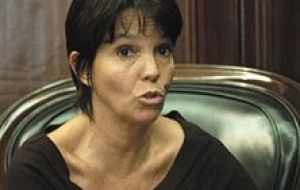MercoPress. South Atlantic News Agency
Kirchner loyalist appointed new Central bank president
 Mercedes Marcó Del Pont supports little autonomy for the Central bank and favors strong government intervention in the economy
Mercedes Marcó Del Pont supports little autonomy for the Central bank and favors strong government intervention in the economy Mercedes Marcó Del Pont a long time ally of the Kirchners and until now head of the state-owned development bank, is known to support limited autonomy for the institution she's taking over. Her appointment closes a standoff over whether the government can overrule the central bank and tap international reserves.
Mercedes Marcó Del Pont a long time ally of the Kirchners and until now head of the state-owned development bank, is known to support limited autonomy for the institution she's taking over. Her appointment closes a standoff over whether the government can overrule the central bank and tap international reserves.
Mrs. Kirchner ordered former bank chief Perez Redrado fired after he refused her instructions to make reserves available to pay off 6.6 billion US dollars in national debt and for other undefined spending disguised under a Bicentennial Fund.
Perez Redrado initially refused to resign and said only Congress could fire him. Mrs. Kirchner signed his final resignation on Wednesday.
The Senate must now confirm the appointment of Ms. Marcó del Pont, 50 years old, an economist who trained at the University of Buenos Aires and has a master's degree from Yale. Ms. Marcó del Pont has since early 2008 been head of state-owned Banco de la Nación, where she has sponsored lending for infrastructure and small and midsize businesses.
A close ally of President Kirchner, Ms. Marcó del Pont has been a strong advocate of government intervention in the economy. Her appointment raises concerns that the government would seek more direct control over the central bank and its reserves.
There are also fears that the institution is less likely to tame rising prices. Officially, inflation was 7.7% in 2008; unofficial estimates suggest the rate is two or three times higher.
As a legislator for the ruling Frente Para la Victoria party between 2003 and 2007, she spearheaded a bill that would have altered the central bank charter, which critics at the time said would have reduced the independence of the institution.
Mrs. Kirchner on Wednesday said the bill, which never made it into law, sought to increase the institution's autonomy by adding job stability and economic growth to the central bank's mandate of preserving the value of the currency.
“If the economy doesn't grow, if wealth isn't created, if consumption isn't created, if jobs aren't created on a sustainable basis, the stability of the currency doesn't last,” Mrs. Kirchner said.
The president said she has also created an Economic Council which will coordinate policy between the Economy Ministry and the central bank, which she said would be similar to councils in Chile, Brazil, and other countries.
Mrs. Kirchner said that Perez Redrado's removal was due to “a negative conduct and the inability to come through on his tasks as a public official.” She added that all discussions relating to his removal from the central bank were “bad for the country”.
The president again defended the creation of the so-called Bicentennial Fund which “will allow Argentina to get better debt swap deals”.
“The Bicentennial Fund, that has made a major impact on the economy as bonds price rocketed, will allow us to get better debt swap deals”, insisted Mrs. Kirchner.
Argentina has pending debts of 20 billion US dollars with (defaulted) sovereign bond holders and another 7 billion with the Club of Paris. The country also needs fresh funds to pay 2010 commitments but unless an understanding is reached with creditors she can’t operate in global money markets and must pay exorbitant rates.
The Bicentennial fund with central bank reserves allegedly will help normalize Argentina’s international standing in global voluntary credit markets.




Top Comments
Disclaimer & comment rulesCommenting for this story is now closed.
If you have a Facebook account, become a fan and comment on our Facebook Page!